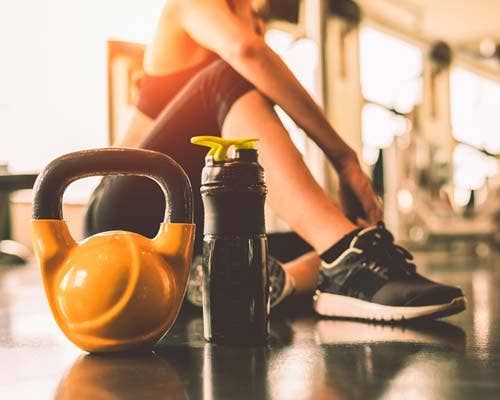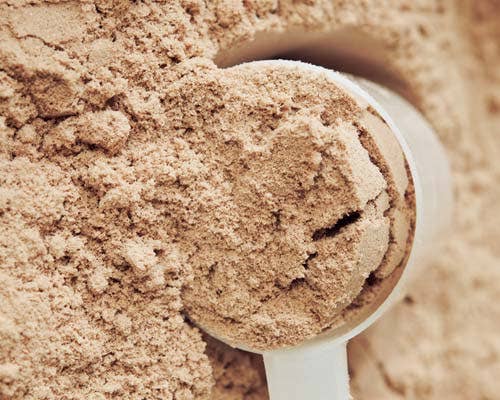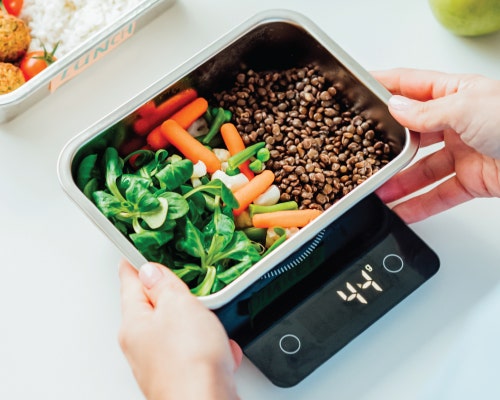How to Use Protein Shakes for Weight Loss or Weight Gain
- 4/27/23


Protein shakes are a handy way to support your weight management goals, as they can be used to help you move your weight in either direction.
While the debate continues around carbohydrates and fat, the fact that protein is a macronutrient your body needs is indisputable. The protein you eat forms the building blocks your body uses to make and repair bones, skin, and everything in between. So whether you want to lose weight, gain muscle, or maintain your health, getting the right amount of protein is a key component.
How To Use Protein Shakes Effectively
When considering how to use protein shakes for weight goals, the first step is to figure out how much protein you need. This provides an insightful starting place to plan around.
Whether your goal is to lose weight or gain muscle, getting the right amount of protein is needed. Generally, you should aim for a higher daily protein target for body composition goals like losing fat or building muscle (or both). Protein recommendations range from about 0.6 grams of protein per pound of body weight (1.4 g/kg) to about 1 gram of protein per pound of body weight (2.2 g/kg) daily.
Speak with your healthcare provider or registered dietitian about your optimal protein target, as it can change based on age, activity level, and certain health conditions.
Next, determine the difference between the amount of protein you should be getting and the protein you already eat from food. One way to do this is by keeping a food log for a few days and calculating your protein intake. Fill in gaps with minimally processed foods first, using healthy protein shakes and other products as needed.
See these helpful articles on Which Protein Is Right For You and An RD’s Guide to The Different Types of Protein Powder to understand how to choose protein sources for your lifestyle.
Losing Weight With Protein Shakes
Don’t underestimate the importance of getting enough protein for weight loss.
Digesting protein burns more calories than digesting carbohydrates or fat. This extra energy doesn’t disappear. It is released as heat and may be a big reason why protein is helpful in weight loss.
Eating protein helps you eat less by making you feel full longer. When compared head to head, gelatin (what collagen protein is made from) may have a more satiating effect than protein from other sources.
Finally, eating protein helps retain muscle while you lose fat, which is even better than losing fat alone.
So, what makes a protein shake good for weight loss?
-
Nutrient-density. It should contain an array of vitamins and minerals you typically get from food.
-
Protein amount and quality. Make sure your supplement meets your needs without being excessive.
-
Low in total calories and little to no sugar. Otherwise, it’s not going to help much with weight loss or overall health benefits.
Every protein shake in the Garden of Life line meets these criteria. Raw Organic Fit protein products are high-protein for weight loss. Raw Organic Meal shakes are a great option for on-the-go nutrition.
Gaining Weight With Protein Shakes
Gaining weight is a good thing when you’re either underweight to begin with or building more muscle.
More muscle means having enough strength, power, and endurance to carry out all your daily activities. Holding on to your muscle into older age and in the presence of a condition that depletes muscle is also critical for good health outcomes.
It’s no secret that protein helps you build muscle. Getting enough protein throughout the day is the most important thing you need to do to gain muscle weight.
Quick Tip: Resistance exercise is the second most important factor for gaining muscle. National guidelines suggest that adults should do at least two sessions of muscle-building exercise every week for optimal health.
If you have a stable weight and lean body composition, gaining muscle will also require eating more calories.
Our protein powders for sport are formulated with gaining muscle in mind. Looking to incorporate protein shakes into your day? Check out our recipes for inspiration!
References:
-
Jäger R, Kerksick CM, Campbell BI, et al. International Society of Sports Nutrition Position Stand: protein and exercise. Journal of the International Society of Sports Nutrition. 2017;14(1):20. doi:10.1186/s12970-017-0177-8
-
Pasiakos SM, Cao JJ, Margolis LM, et al. Effects of high-protein diets on fat-free mass and muscle protein synthesis following weight loss: a randomized controlled trial. FASEB J. 2013;27(9):3837-3847. doi:10.1096/fj.13-230227
-
Ravn AM, Gregersen NT, Christensen R, et al. Thermic effect of a meal and appetite in adults: an individual participant data meta-analysis of meal-test trials. Food Nutr Res. 2013;57:10.3402/fnr.v57i0.19676. doi:10.3402/fnr.v57i0.19676
-
Veldhorst MAB, Nieuwenhuizen AG, Hochstenbach-Waelen A, et al. A breakfast with alpha-lactalbumin, gelatin, or gelatin + TRP lowers energy intake at lunch compared with a breakfast with casein, soy, whey, or whey-GMP. Clinical Nutrition. 2009;28(2):147-155. doi:10.1016/j.clnu.2008.12.003
-
Areta JL, Burke LM, Camera DM, et al. Reduced resting skeletal muscle protein synthesis is rescued by resistance exercise and protein ingestion following short-term energy deficit. American Journal of Physiology-Endocrinology and Metabolism. 2014;306(8):E989-E997. doi:10.1152/ajpendo.00590.2013
-
U.S. Department of Health and Human Services. Physical Activity Guidelines for Americans, 2nd edition. Washington, DC: U.S. Department of Health and Human Services; 2018.





